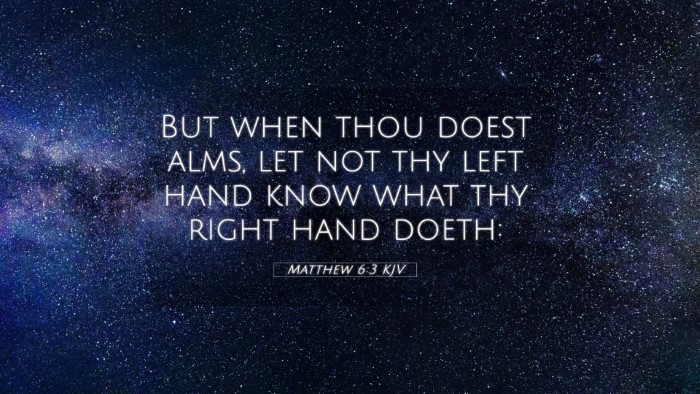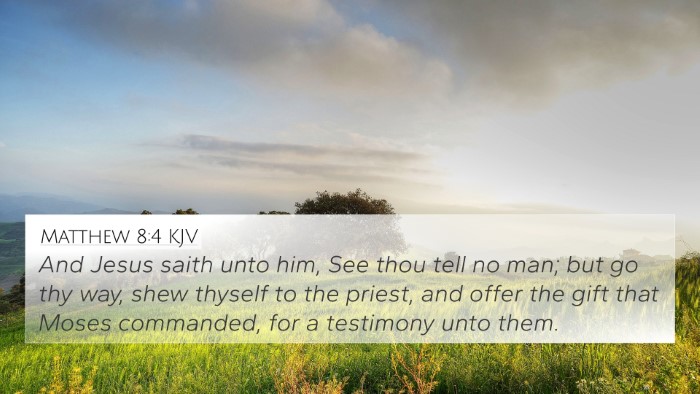Understanding Matthew 6:3
Matthew 6:3 states, "But when you give to the needy, do not let your left hand know what your right hand is doing," which emphasizes the importance of humility and sincerity in acts of charity. This verse encourages believers to perform acts of kindness discreetly, ensuring that their motivations are pure and not for the purpose of gaining public recognition or praise.
Insights from Public Domain Commentaries
Matthew Henry
According to Matthew Henry, this verse instructs Christians to give without seeking acknowledgment. He notes that true charity is motivated by love and a desire to help others without drawing attention to oneself. Henry emphasizes that God sees the heart and rewards those who give selflessly, highlighting the importance of internal motivations over external displays.
Albert Barnes
Albert Barnes elaborates on the importance of discretion in giving. He points out that the phrase "let not your left hand know what your right hand doeth" signifies the necessity of keeping our charitable actions private, allowing God to be the sole witness. He emphasizes that public recognition can taint the purity of one's intentions, therefore, true giving should be a private matter between the individual and God.
Adam Clarke
Adam Clarke further discusses this verse in the context of the Mosaic Law and Jewish traditions, commonly noting that the Pharisees often engaged in ostentatious acts of charity. Clarke underscores the idea that Jesus contrasts this behavior by teaching genuine humility and integrity, encouraging believers to avoid seeking the applause of men in favor of divine approval.
Cross-References for Matthew 6:3
- Proverbs 19:17: "Whoever is generous to the poor lends to the Lord, and he will repay him for his deed." This verse correlates with Matthew 6:3's call for sincere and humble giving.
- Luke 14:12-14: "When you give a luncheon or dinner, do not invite your friends, your brothers, your relatives or your rich neighbors; if you do, they may invite you back and so you will be repaid." This passage reinforces the need for selfless acts.
- 1 Corinthians 13:3: "If I give away all I have, and if I deliver up my body to be burned, but do not have love, I gain nothing." Here, Paul highlights the necessity of motive in giving.
- Matthew 5:16: "Let your light shine before others, so that they may see your good works and give glory to your Father who is in heaven." This provides a contrast to the intentions behind charitable acts.
- Acts 10:4: "And he stared at him in terror and said, 'What is it, Lord?' And he said to him, 'Your prayers and your alms have ascended as a memorial before God.'" This emphasizes the heavenly acknowledgment of sincere deeds.
- Galatians 6:9: "And let us not grow weary of doing good, for in due season we will reap, if we do not give up." This verse encourages perseverance in good deeds.
- Matthew 23:5: "They do all their deeds to be seen by others." This serves as a caution against the hypocrisy of seeking recognition.
Thematic Bible Connections
This verse forms a part of a broader discourse on the nature of true righteousness and the contrast between genuine faith and the acts of outward religion aimed at impressing others. It connects well with the themes of humility, integrity, and the private nature of faith that runs throughout the New Testament.
Connecting Matthew 6:3 to the Wider Biblical Context
The call for humility in giving invites a deeper examination of scripture, compiling biblical cross-references to understand how themes intersect and are mirrored throughout both Testaments. Engaging in cross-referencing can unveil the richness of biblical themes, such as:
- The call to selflessness shown in Matthew 6:3 aligns with many other verses encouraging charity and kindness.
- Comparative studies between the individual generosity in the Old Testament and New Testament highlight the continuity of God's call to love one's neighbor.
- Examining the providence of God concerning our giving, as seen in the narrative of the widow’s offering in Mark 12:41-44, can deepen our understanding of sacrificial giving.
Resources for Bible Cross-Referencing
Engaging with scripture through cross-referencing can be enhanced through various tools and methodologies, such as:
- Bible Concordance: A valuable resource for finding related verses and thematic connections.
- Cross-Reference Bible Guides: Structured resources that assist readers in exploring Biblical texts for parallels.
- Comprehensive Bible Study Tools: Utilizing technology for verse exploration can reveal deeper insights.
Conclusion
In conclusion, Matthew 6:3 serves as a profound reminder to approach acts of charity with the right heart posture. Engaging with this verse through various cross-references and thematic connections allows believers to enrich their understanding of Christian giving and foster a deeper relationship with God as they practice selfless love. Recognizing how scripture dialogues with itself invites a holistic understanding of Biblical teachings and fosters a shared community of faith.







